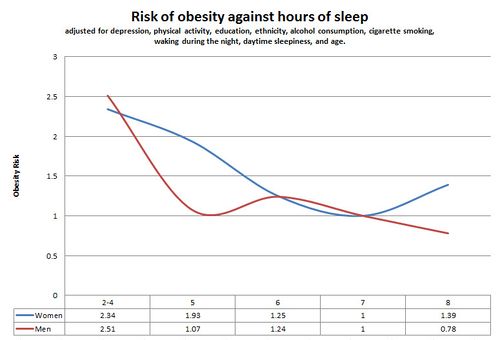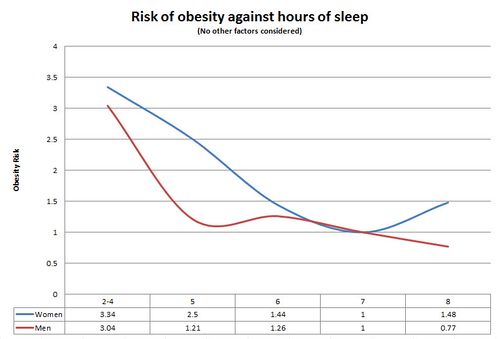Sleep and Obesity
Does a lack of sleep make you fat? There is good evidence that less than 7 hours sleep dramatically increases your risk of obesity.
1 The Research
A study[1] looked at data from about 7,000 people from 1971 to 1992 to see how sleep was linked to obesity. They controlled the results for depression, physical activity, education, ethnicity, alcohol consumption, cigarette smoking, gender, waking during the night, daytime sleepiness, and age. Compared with people who sleep 7 hours per night, people who sleep 2-4 hours per night were more than twice as likely to be obese. Likewise, people who slept 5 hours sleep were 60% more likely to be obese and people who slept 6 hours were 27% more likely. Below you can see the risk of obesity controlled for the risk factors. As you can see, the risk of obesity drops sharply with increased sleep up to 7 hours per night. For men 8 hours is better than 7, but not for women, though it's not clear why this should be. (I have ignored the data for 9+ hours of sleep as the number of people is small and the data looks skewed.)
Without controlling for other factors, you see a similar, but more pronounced results.
2 How and why sleep effects weight
Sleep deprivation has been shown to cause a marked increase in appetite though the hormone Leptin. Also sleep deprivation has been shown to cause Insulin Resistance. One theory behind sleep deprivation causing weight gain is that it is a survival mechanism. The most likely cause of sleep deprivation in a natural situation is summer in northern latitude, where the days are long and the nights are short. These northern summers are followed by northern winters, which can be particularly hard, with a scarcity of food. Therefore gaining lots of body fat in summer would help survive the scarcity of food in the coming winter. This mechanism causes problems in our modern society with its controlled lighting, where we have perpetually long days.
3 References
- ↑ Inadequate sleep as a risk factor for obesity http://www.journalsleep.org/Articles/281017.pdf

